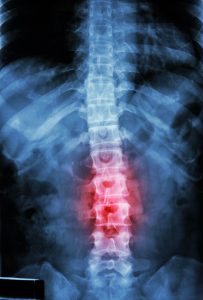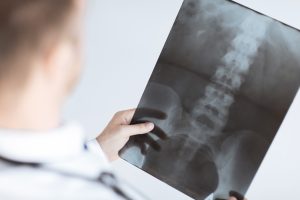If you suffered a spinal injury at work, you may be wondering if you could be eligible to receive compensation. Within this guide, we will set out the eligibility criteria for making a personal injury claim following an accident at work.
Additionally, we will also provide examples of different workplace accidents that could lead to you suffering a back injury. This guide will also share the importance of gathering evidence to support your claim, as well as providing some examples.
Furthermore, we explain how your injuries may be valued and the different heads of loss you could be awarded following a successful claim. Our guide finishes by explaining how one of the No Win No Fee solicitors on our panel could help you with your work related injury claim.
You can contact our advisors today to receive a free consultation. They are available 24 hours a day to offer you free advice for your case, as well as answering any questions you may have.
To reach them today, you can:
- Call our dedicated team on 0208 050 2736
- Complete the claim online form to receive a callback.
- Ask our advisors a question using the live chat pop-up.
Jump To A Section
- When Are You Able To Claim For A Spinal Injury At Work?
- How Could A Back Injury At Work Be Caused By Employer Negligence?
- Is There An Average Payout For A Spinal Cord Injury?
- Evidence That Could Be Used In A Spinal Injury At Work Claim
- Claim Compensation For A Spinal Injury At Work On A No Win No Fee Basis
- More Resources About Workplace Injury Claims
When Are You Able To Claim For A Spinal Injury At Work?
While you are in the workplace and performing your work-related duties, you are owed a duty of care by your employer. This is set out under the Health and Safety at Work etc. Act 1974. Per their duty of care, they must take reasonable and practicable steps to help ensure your health and safety.
To fulfil their duty of care, employers could take actions such as conducting regular risk assessments, ensuring all employees have received appropriate and sufficient training, and regularly maintaining any workplace machinery and equipment.
If you have suffered a spinal injury at work, in order to be eligible to make a personal injury claim, you would need to demonstrate:
- Your employer owed you a duty of care.
- They breached their duty of care.
- You suffered an injury because of this breach.
To see whether you may have a valid claim, or to ask any questions about the personal injury claims process, you can contact a member of our advisory team.
How Could A Back Injury At Work Be Caused By Employer Negligence?
There are various ways that you could suffer a spinal injury at work. However, for your personal injury claim to be valid, you will need to prove that your back injury was directly caused by your employer breaching their duty of care.
Some examples of accidents that could lead to work related back injuries include:
- If you are required to perform manual handling duties as part of your job, your employer should provide you with appropriate training. If they fail to do so, you could suffer a sprain or soft tissue injury due to poor lifting technique.
- While working in the stockroom, your employer provides you with a known fault ladder. While you are using the ladder, one of the rungs breaks, causing you to fall from a height. This causes you to suffer multiple injuries, such as severe spinal damage and a broken arm.
- Your employer fails to maintain a forklift at your warehouse job regularly. This causes the forklift to malfunction as you are using it, and it crashes into a wall, and you suffer a spinal injury as well as a broken leg.
For further guidance on when you could claim for an injured back at work, speak to a member of our advisory team. They can also check the eligibility of your specific case.
Is There An Average Payout For A Spinal Cord Injury?
If you make a successful claim for suffering a spinal injury at work, you will be awarded general damages as part of your compensation settlement. This is the head of loss that compensates you for the physical and psychological pain and suffering your injury has caused you.
The Judicial College Guidelines (JCG) may be referenced by those responsible for valuing your injuries. This is a document that provides compensation guideline brackets for different injuries. In the table below we have used some of the entries that relate to back injuries at various severities. Please only refer to them as a guide.
Additionally, the top entry has not been taken from the JCG.
Compensation Guidelines
| Area of Injury | Severity | Compensation Guidelines | Definition |
|---|---|---|---|
| Severe Multiple Injuries and Special Damages | Severe | Up to £250,000+ | This award would tend to reflect severe multiple injuries and their financial losses, including care costs, travel expenses and a loss of earnings. |
| Back | (a) Severe (i) | £91,090 to £160,980 | The most severe examples of nerve root and spinal cord damage that cause very severe pain and disability as well as incomplete paralysis. |
| Back | (a) Severe (ii) | £74,160 to £88,430 | This includes cases of nerve root damage with the associated sensation loss, impaired mobility and damage to bladder and bowel function. |
| Back | (a) Severe (iii) | £38,780 to £69,730 | Cases of fractures and disc lesions to the vertebral bodies as well as soft tissue injuries that give rise to chronic conditions, even after surgery. |
| Back | (b) Moderate (i) | £27,760 to £38,780 | Cases of compression/crush fractures in the lumbar vertebrae and a substantial risk of constant pain, osteoarthritis and traumatic spondylolisthesis. |
| Back | (b) Moderate (i) | £27,760 to £38,780 | Example injuries include the lumbar vertebrae suffering a crush or compression fracture causing constant pain. |
| Back | (b) Moderate (ii) | £12,510 to £27,760 | This bracket covers many encountered types of spinal and back injuries (such as disturbed ligaments and muscles) that cause pain. |
| Back | (c) Minor (i) | £7,890 to £12,510 | Cases where a full recovery (or to a nuisance level) takes place without the need for surgery within approximately 2 - 5 years. |
| Back | (c) Minor (ii) | £4,350 to £7,890 | Examples of full recovery that takes place without the need for surgery within a period of about 1 - 2 years. |
| Back | (c) Minor (iii) | £2,450 to £4,350 | Cases where full recovery takes place without the need for surgery between 3 months and 1 year. |
| Back | (c) Minor (iv) | Up to £2,450 | This bracket looks at cases of a full recovery within 3 months. |
Can Claiming Special Damages Affect Your Back Injury At Work Payout?
Special damages is the second head of loss that could be included in your compensation settlement. This aims to reimburse your financial losses that have been caused by your injuries. This can include costs and losses such as:
- A loss of earnings, if you needed to take time off work.
- Medical expenses, such as paying for over-the-counter pain relief.
- The cost of care if you required help with daily tasks due to your injuries.
- The cost of adaptations needed at home.
- Travel expenses to essential appointments (such as parking, petrol or public transport fares).
When claiming for these costs you will need to present evidence of them. This is why keeping any documents such as payslips and bank statements that show these losses could help support your claim.
Contact our advisors today to receive a free valuation of how much compensation you could potentially receive for your spinal injury at work claim.
Evidence That Could Be Used In A Spinal Injury At Work Claim
Gathering evidence is a crucial step towards making a successful claim for a back injury at work. The evidence you collect will need to demonstrate how your employer was liable and the severity of the spinal injury you suffered.
Examples of potential evidence that could be used to support your back injury claim include:
- Medical evidence of your spinal injury. This can be X-rays and your medical records.
- Photographs of the accident scene.
- Any CCTV footage that captured your accident.
- Witness contact details of anyone who saw your accident. They could be approached at a later date to provide a statement.
- A copy of your accident report. Workplaces with over 10 employees must have an accident book on site.
A solicitor could help you with gathering this and any additional evidence to support your case if you choose to work with one. Contact our advisors today to see if one of the personal injury solicitors on our panel could help you.
Claim Compensation For A Spinal Injury At Work On A No Win No Fee Basis
If our team of advisors find that you have a strong claim after suffering a spinal injury at work, they could put you in touch with one of the specialist solicitors on our panel. One of them may offer their services to you through a type of No Win No Fee contract and may suggest the use of a Conditional Fee Agreement (CFA). There are numerous advantages to being represented in your claim under a CFA.
The first one is that you generally won’t be expected to pay your solicitor anything upfront or while the claim is processing for their services. Additionally, if the claim fails, you will not need to pay them for the work they have provided.
A small and legally restricted percentage will be taken from your compensation by your solicitor if your claim succeeds. This is referred to as a success fee. The legal cap helps to ensure that the majority of your compensation stays with you.
Contact Our Advisors
To see whether you could make a spinal injury at work claim with one of the No Win No Fee solicitors on our panel, you can contact a member of our advisory team. They can answer any questions you may have about claiming for a work related back injury as well as offer free advice for your specific case.
To speak with our team, you can:
- Call 0208 050 2736
- Complete our claim online form to receive a callback.
- Use the live chat pop-up to ask a question.
More Resources About Workplace Injury Claims
Additional accident at work claims guides by us:
- If you are wondering, ‘What are my rights following an accident at work?’, this guide may be helpful to you.
- A guide providing top tips on preventing an accident in the workplace and when you may have a valid claim.
- A guide providing some examples of the most common causes of injury at work, and when you could make a claim for your injury.
Additional resources:
- This guide offers advice about back pain from the NHS,
- Guidance on when you could claim statutory sick pay (SSP) from Gov.UK.
- Information and guidance regarding back pain in the workplace from the Health and Safety Executive (HSE).
If you have suffered a spinal injury at work, you can contact our advisors today to see whether you may have a valid personal injury compensation claim.




